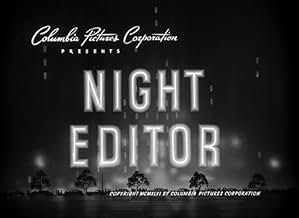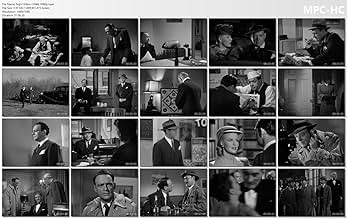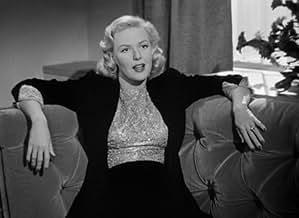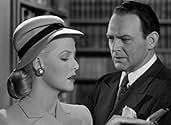A detective's dilemma. A murder investigation is compromised by the detective's compromised position in love.A detective's dilemma. A murder investigation is compromised by the detective's compromised position in love.A detective's dilemma. A murder investigation is compromised by the detective's compromised position in love.
- Director
- Writers
- Stars
- Doc Cochrane
- (as Robert Stevens)
- Boy
- (uncredited)
- Tusco
- (uncredited)
- Dickstein
- (uncredited)
- Doc Cochrane as a Boy
- (uncredited)
- District Attorney Bill Halloran
- (uncredited)
- Fat Man in Library
- (uncredited)
- Reporter
- (uncredited)
- Benjamin Merrill
- (uncredited)
- Director
- Writers
- All cast & crew
- Production, box office & more at IMDbPro
Featured reviews
The film gets off to a slow start - the first fifteen minutes are actually quite annoying as we have to suffer some crass dialogue from a boy, eg, "I get lonesome sometimes". It's unrealistic dialogue and makes the boy seem like a drip. You can actually see why Gargan is having an affair when we are also introduced to the sickly nice Jeff Donnell (Martha) who plays his wife. If you can get past the rather sentimentally awful beginning, then you will be rewarded as scheming Janis Carter makes an appearance.
As regards the cast, everyone has good and bad moments: Janis Carter is unintentionally hilarious when she loses control of her emotions and begs to see the dead body of the murdered woman, Paul E Burns (Strom) puts on an awful foreign accent from nowhere but succeeds in being likable as Gargan's police buddy, while Gargan himself is a bit too zombie-like on occasion.
Despite the cast being slightly off, the film still works and the story keeps you watching. You may guess the outcome but you will also be entertained by some of the twists.
This film version, very tightly directed by Henry Levin, and starring the then aging and rumpled William Gargan, is a definite Noir artifact of the late 1940's.
There's little pity in this compact story of sex and brutality. Unusual for a film of this time period, the femme fatale is depicted as a woman who feeds on cruelty and takes gleeful joy in looking at the battered corpse of one of her previous friends. Murder and perversion seem to function as the only things she truly loves. They are what she demands others give her so she may feed the bottomless emptiness within.
Originally fashioned as a pilot episode for a new continuing series like its radio show progenitor, the film was a failure upon release, but succeeds as a stand alone example of the close ties between sex and sadism in the continuing Noir cycle.
On a newspaper night shift, the people in the newsroom are told the story of Tony Cochrane, a police officer. This was the first in a planned series of night editor stories, which never happened.
Tony was a married man cheating on his wife (Jeff Donnell) with a married socialite, Jill Merrill (Janis Carter). One night, they're parking down by the beach, and they see a man beat a woman and run away. They both see his face clearly. Tony could have apprehended the man, and perhaps even stopped the murder (though it seemed to have happened very quickly) but he was afraid of being found out and losing his wife, son, and his job.
When the murder is reported, Tony has to investigate, not letting on that he was a witness. By now he's broken things off with Jill. He's surprised to see her name on a list of the dead woman's friends. He confronts her, because he suspects she recognized the man, but she won't tell him the man's identity. Things go from bad to worse.
This was pretty good and effective, with a nice ending. Gargan by then wasn't anyone's idea of a leading man, but was a good playing a cop. Gargan had a laryngectomy in 1960, after which he devoted his time to the American Cancer Society and used a voice box.
Janis Carter is a glamorous femme fatale here and plays a woman devoid of any conscience or compassion. In fact, when she learns the dead woman's face had been bashed in, she wants to see it. The idea is, she's married to an older rich man and likes slumming.
I wasn't expecting much from this two-noir disc from Netflix, but I would up liking both of them.
I had never seen Janis Carter in a B Noir movie but if this is what she is capable of then some of her others might be worth looking for. The words just one more kiss really take on true meaning with Janis Carter. But watch out for that ice pick.
Did you know
- TriviaThe car the murderer uses is a rare 1933 Packard Standard Eight Coupe Roadster. In excellent condition in 2020 this car could sell for well over $100,000.
- GoofsAlthough the majority of the movie is a prolonged flashback set in the early 1930s, absolutely everything (with the exception of a few vintage cars) - hairstyles, wardrobe, music and decor, is strictly contemporary 1946, without the slightest attempt at accuracy.
- Quotes
Jill Merrill: I don't need you, I can buy and sell you.I don't know why I bother seeing you.
Tony Cochrane: You don't know why? I'll tell you. You're rotten rich through and through.Like something they serve at the Ritz,only its been laying out in the sun too long.
Jill Merrill: That's right, Tony, you're not my kind. The clean cut type.Little tootsie-wootsie loves her great big stupid peasant.
Tony Cochrane: Yeah, for all your dough, like a ton of bricks!
Jill Merrill: How picturesque. And you were totally unresponsive?
Tony Cochrane: You're like a sickness. I was sick!
Jill Merrill: No, Tony it was a fever!
Tony Cochrane: Its a nightmare! With convulsions!
- ConnectionsSpin-off Night Editor (1952)
- How long is Night Editor?Powered by Alexa
Details
- Release date
- Country of origin
- Language
- Also known as
- The Trespasser
- Production company
- See more company credits at IMDbPro
- Runtime1 hour 8 minutes
- Color
- Aspect ratio
- 1.37 : 1
Contribute to this page


































